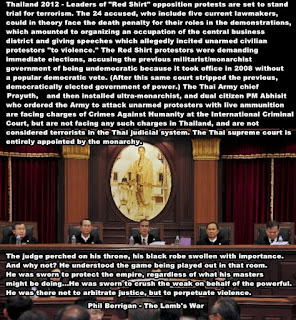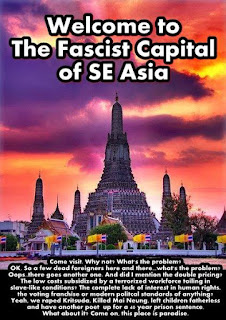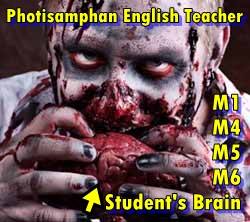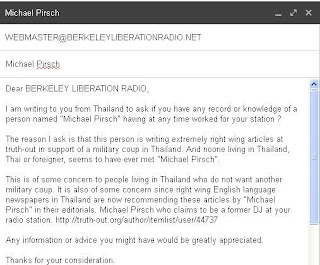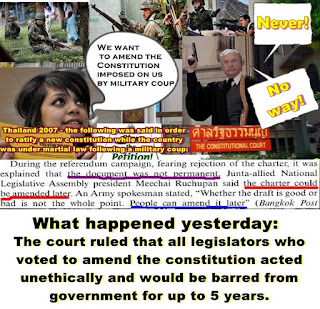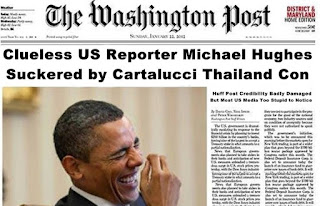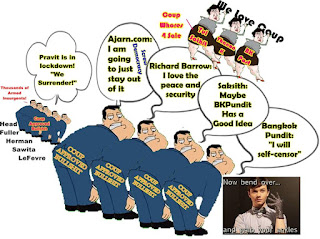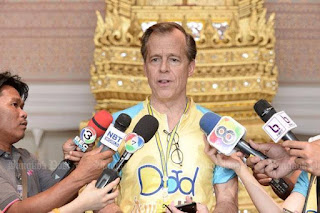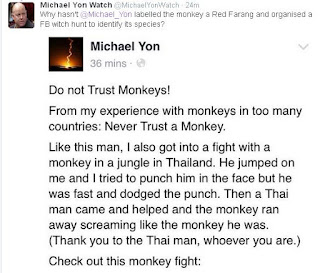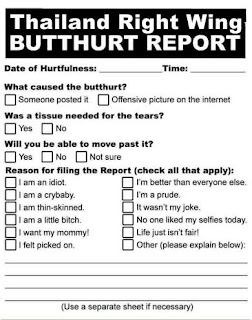Falling Head First Off the Noble Eightfold Path -
Bhumibol's Corruption of the Institution of the Dharmaraja
by Wes Man on Sunday, September 26, 2010 at 12:04pm
"Old Master...look at you now...You have, in sum, assembled all the 6 robbers together. How
could you possibly get to the Western Heaven to see Buddha?"- The Monkey King, Wu
Ch'eng En "Journey to the West"
"That which the wise man will not take, the king will go through fire and water to obtain."-
Jack Kerouac, Wake Up: A Life of the Buddha
This is a story about The Noble Eightfold Path and how the Thai king Bhumibol has failed to
follow it.
In doing so, he has compromised the sacred institution of the Dharmaraja – the Buddhist Dharma
King – which he claims is the central institution representing Thai culture and the country of
Thailand. The king is considered the absolute center and guarantor of Thailand’s sovereignty.
Therefore his failure must be counted as one of the great tragedies in the recent history of
Thailand.
The Noble Eightfold Path is the central teaching of Siddhartha Gautama and the foundational
teaching of Buddhism. I was first introduced to these concepts from the American
Catholic/Buddhist writer Jack Kerouac. Being a basic and simple minded guy, I take what I read
at face value. I don't know about any Machiavellian exceptions for kings or royalty to these
guidelines. I am not aware of any rationalizations or equivocations that may be written in the
Thai language about these guidelines, and I don't know how or why anyone might have a special
pass for reasons of statecraft or national security. If you know of any exceptions or shortcuts
please tell me. Otherwise I will assume that failure, and especially conscious and premeditated
failure to follow these guidelines will not lead to wisdom, the cessation of suffering or to
Nirvana
My primary criticisms of Bhumobol come from his multivarious failures of ethical conduct. I
cannot speculate about the state of his mental discipline; but 60 years of violence, embrace of
militarism, corruption of justice and the rule of law, and contempt for democracy belie a troubled
mind indeed. Conduct, after all, lays the foundations for the mental discipline and wisdom which
lead to Nirvana. "All higher spiritual development is not possible without this moral basis."
To whom much is given, much is expected. Thus follows an outline of the Eightfold path in
bold, taken from an English language Theraveda Buddhist text that I found in a vegetarian
restaurant in Phnom Penh. My criticisms are in regular type.
The Noble Eightfold Path
1. Right Understanding (Samma ditthi)
2. Right Thought (Samma Sankappa)
3. Right Speech (Samma Vaca)
4. Right Action (Samma Kammanta)
5. Right Livelihood (Samma Ajiva)
6. Right Effort (Samma Vayama)
7. Right Mindfulness (Samma Sati)
8. Right Concentration (Samma Samadhi)
These 8 items are divided into three areas
(a) Ethical Conduct (Sila)
(b) Mental Discipline (Samadhi)
(c) Wisdom (Panna)
Ethical Conduct (Sila) -
The conception of universal love and compassion for all living beings - on which the
Buddha's teaching is based.
For the good of the many, out of compassion for the world (bahujanahitaya
bahujanasakhaya lokanukamaya)
The first and perhaps most critical charge is that the Thai king has split his kingdom. He has
divided his subjects. He extols those who support his politics and punishes unto death those who
have different ideas. This process began in the mid-1950s when Bhumibol and his supporters
overthrew the secular government of Phaibun, and has continued unabated and with impunity to
the present day, when ½ or more of the Thai population has been condemned to the status of a
hated “out group” - Serfs whose lives, rights thoughts and very humanity have been rejected by
the man charged with the station of their Dharma king.
Ethical conduct involves
Right Speech
Right Action
Right Livelihood
Right Speech =
1. Abstention from telling lies.
Bumhibol has equivocated to no end when it served his secular purposes, and hypocritically and
conveniently changed his position 180 degrees when he needed justification for any number of
his hypocritical interventions in Thai politics. Like advocating use of the constitution transfers of
power in 1992 and using this to shame Chamlong Srimuang for not following the impossible
path of amending the constitution when all hope of doing so had been compromised by
Bhumibol’s own appointments to the Thai “senate”. In the same conflict praise was given for
“following the constitution” to the brutal, corrupt and murderous general Suchida who Bhumibol
favored. Then Bhumibol started talking out the other side of his mouth by fully supporting use of
the Thai military to seize power in 2006 in complete contempt of the constitution and
international law. Now refusing to follow the constitution is fine when it serves to give power to
the monarchy and those who support Bhumibol’s despotic monarchist philosophy of
government.
2. Abstention from backbiting slander and talk that may bring about hatred, enmity,
disunity and disharmony among individuals or groups.
3. Abstention from harsh, rude, impolite, malicious, abusive language.
4. Abstention from idle useless foolish babble and gossip.
When abstaining from these 4, one must speak the truth and use words that are friendly,
benevolent, pleasant, gentle, meaningful and useful. If one cannot say something useful, one
should keep noble silence.
Bhumibol always has the luxury of maintaining a fictional silence, when he has on his payroll, a
coterie of monarchist henchmen who can abuse, slander and libel opponents on his behalf. One
of the first cases of this occurred in 1956 when Royalist General Sarit's political party accused
Phaibun’s secular government of committing lesse majeste - which began the process of a
military overthrow of Phaibun’s government and the re-entrenchment of Bhumibol’s monarchy
which Phaibun and Pridi had opposed since 1932. The process continues up to this day when the
king can claim – with a straight face - that lesse majeste is an anachronism, while his thuggish
minions have increased prosecution of these cases by 1500% since the coup of 2006. Bhumibol
might only be accused of foolish babble when his public speeches are subjected to non-partisan
discursive analysis.
Right Action - Aims at promoting moral, honorable and peaceful conduct.
1. Abstain from destroying life.
Here are just a few examples: Bhumibol overtly or tacitly endorsed the Thai Army's butchering
of Thai citizens in 1972, 1976, 1992,and 2010. He sent Thai soldiers to fight in Vietnam, allowed
the US military to use Thailand as a base to attack Cambodia and to drop more bombs on Laos
than were dropped by all Allies combined during the Second World War. Lao people still suffer
scores of casualties each year from unexploded ordinence from the Vietnam war. Bhumibol
refused to provide clemency to 3 people who were put to death for the shooting of his brother
(which conveniently resulted in his ascension to the Thai throne.). Years later he equivocated by
claiming to have lost track of time.
2. Abstain from stealing.
This could include the premeditated overthrow of Phaibun's government in 1956, stealing the
Thai people's legitimately elected government in 2006, claiming the right to sociopathicly not to
pay taxes for 60+ years, charging usurious interest through the Siam Commercial Bank, and
possible – but as yet unproven - usurpation of the Throne itself
3. Abstain from dishonest dealings.
This might include endorsing the overthrow of elected governments, unconditional, generations
long support for gangster-like elements in the Thai military, looking the other way as sex tourism
is used to promote the Thai economy, refusing to pay taxes, using lesse majeste to jail all
opponents, practicing usery at the Siam Commercial bank to make a profit off the backs of one’s
own subjects, refusing to advocate for the political enfranchisement and economic emancipation
of poor and dark skinned subjects and treating the territory of Isaan as a conquered economic
colony.
4. Abstain from illegitimate sex.
No one knows if Bhumibol had any affairs, but at the end of 1957 the Queen’s younger sister
Busba became pregnant with no known publicly recognized suitor. She later married a guy who
was not her boyfriend. She had a daughter and divorced a few years later.
While the Busba affair cannot be proven, it is widely known that illegitimate sex is promoted as
10% of the Thai national GDP is based upon a certain kind of ‘tourism’. In defense, Thai
prostitution is claimed to be part of Thai culture, but it increased dramatically when American
soldiers – the long term defenders and promoters of Bhumibol’s monarchy - occupied bases in
Thailand in the 1960s. And because the king is the center of ‘Thai culture’ he carries ultimate
responsibility for continuation of this moral and economic exploitation of his subjects.
5. Try to help others to lead a peaceful and honorable life.
Including his son, who would definitely not pass provision #4 and who was sent to the best
military school in Australia, and is known to make videos of his wife crawling submissively on
the floor and holding lavish parties for his dog while Thai people sweat and labor for starvation
wages. The Buddhist king sent his son to military school(!!!) rather than send him to study
philosophy, languages, history, religion, ethics, politics, sciences or any other subject besides
killing.
Economic policy in Thailand has zealously followed the “free market” ideology which has
turned the country into a low-wage plantation, exploited by foreign corporations. Under
Bhumibol’s economic stewardship, Thailand has failed to follow documented and obviously
successful protectionist practices used by Korea, Taiwan and Singapore to establish economic
sovereignty and become rich, developed first world countries. This may be considered the price
of slavishly promoting and sponsoring corrupt, despotic, opportunistic military leaders who kow-
tow to Bhumibol's throne, but who also take every opportunity to loot the country and people of
Thailand.
Right Livelihood - abstaining from making a living through a profession that brings harm
to others, such as:
1. Trading in arms or lethal weapons
The king is Commander in Chief of the Thai military, both nominally and in actuality. Thus he
holds ultimate responsibility for their actions, corruption and misdeeds – although you would
never believe this given the craven treatment of the fact by all involved, including the Thai
media.
The Thai military is Bhumibol’s personal mercenary army and guarantor of monarchist power.
The king has been up to his neck in military intrigue for decades. This began in 1953 when
Bhumibol adopted General Phao’s brigade, (i.e., runners of Phao’s drug and protection rackets)
known as The Border Patrol Police (BPP) as being exclusively responsible for protection of the
Thai king.
2. Intoxicating drinks and poisons
One of the easiest rules to follow. This king smoked and drank openly for almost 40 years. A
Dharmaraja indeed.
3. Killing animals
This king is not and has never at any time been reported to be a vegetarian.
4. Cheating
This should be avoided, except in politics, where the king’s view will prevail at any cost to
fairness, democracy, truth, or the views and opinions of his subjects.
Live by a profession which is honorable, blameless and innocent of harm to others.
Buddhism is strongly opposed to any kind of war.
War should be avoided, except against Vietnam, when the benefactor of your excesses – The
USA - demands your submission. A nation lead by a Dharmaraja should never engage in
aggressive war, except against the people of Cambodia and Laos who have long suffered under
the Chakri Buddhist war machine of Thailand.
Right Speech, Right Action, Right Livelihood - these three factors constitute Ethical
Conduct which aims at promoting happy and harmonious life both for the individual and
for society.
This moral conduct is considered as the indispensable foundation, for all higher spiritual
development is not possible without this moral basis.
________________
This is the path. It is inconceivable that the king of Thailand and his advisers were unaware of
these practical proscriptions made by the Buddha himself. To think that Bhumibol spent the
entirety of his rule in direct contempt of so many of these practices suggests an unconscionable
failure of character and abdication of responsibility. His corruption of the Dharmaraja must rank
as one of the ultimate Buddhist transgressions in modern history.
Any excuse or rationalization for the king’s actions – however well-meaning they may have been
- must be measured against their impact upon Thailand. In the Buddhist year of 2553, The king
of Thailand has bequeathed unto his subjects a totalitarian dictatorship which bases its power on
violence, censorship, big-brother style policing of the press and the internet, the termination of
free expression in defense of monarchist power, and total intimidation of free thought,
Today in Thailand, the most lawless and sociopathic acts go unpunished as long as they support
the monarchy.
Children are hounded by the police for ideological political crimes. University students who
should be practicing inquiry and asking questions are blacklisted and hounded by dogmatic
professors. University theater is vetted for Soviet style party-line purity.
The entire structure of the Thai economy is set up to exploit the labor of large sections of the
population in order to enrich a tiny pro-monarchist elite - including the king himself who will at
the expense of his kingdom, die as one of the richest persons on earth. Prostitution is rampant in
Thailand and tolerated at every level. A fish rots from the head. Sane economic reforms that
might benefit the poor who are driven by desperation to work in these appalling conditions have
been studiously ignored by monarchists for generations. The structural and cultural sell-out to
foreigners in general and Washington in particular has been total. Reliance on foreign companies
to create jobs and employment is a rampant and functions as an economic cancer.
The Thai population continues to be terrorized by the lesse majeste law, which sends people to
prison for decades for crimes of speech, while murderers might at the same time, be jailed for as
little as 3 years.
The judicial system – entirely appointed by the king – is completely partisan and ideologically
committed to preservation of the monarchy at the expense of justice.
The majority of the Thai the population that demands enfranchisement and recognition of their
votes have been deemed an enemy of the state and thus of the monarchy. 149 protesters were
killed in April-May of 2010 and over 3000 people were sent to the hospital without comment
from the monarchy. So far not a single person has been held accountable or responsible for these
acts. The king is the nominal head of the armed forces and thus he carries the ultimate
responsibility for persons acting in his name, but as yet not one person from his camp has
acknowledged the magnitude of the tragedy.
The institution of the Dharmaraja could not have been more corrupted if there was a demonic
alien invasion with a plan to destroy its honor and integrity forever. The betrayal of Thailand has
been almost total and absolutely catastrophic in its impact.
However, because of Bhumibol’s Dharmaraja rule-of-terror, no Thai person who values their
life, family or career will ever publicly acknowledge any of these criticisms. Honest historians
will have the final say on the success or failure of Bhumibol in his role as Thailand’s Dharma
King.
Appendix 1 – Heart Sutra from the Monkey King
Old Master, you have forgotten the one about eye, ear, nose, tongue, body. Those of us who have
left the family should see no fault with our eyes, hear no sound with our ears, should smell no
smell with our noses, should taste no taste with our tongues. Our bodies should have no
knowledge of heat or cold, and our minds should gather no vain thoughts. This is called the
extermination of the 6 robbers.
But look at you now...Though you may be on your way to seek scriptures, the mind is full of vain
thoughts. Fearing the demons, you are unwilling to risk your life. Desiring vegetarian food you
arouse your tongue. Loving fragrance and sweetness, you provoke your nose. Listening to
sounds, you disturb your ears. Looking at things and events, you fix your eyes. You have, in sum,
assembled all the 6 robbers together. How could you possibly get to the Western Heaven to see
Buddha?
- The Monkey King, "Journey to the West" by Wu Ch'eng En
Appendix 2 - The remaining elements of the Noble Eightfold path:
Mental Discipline
Right Effort
Right Mindfulness
Right Concentration
Right effort is the energetic will
1. to prevent evil and unwholesome states of mind from arising
2. to get rid of such evil and unwholesome states that have already arisen
3. to produce and to cause to arise good and wholesome states of mind not yet arisen
4. to develop and bring to perfection good and wholesome states of mind that are already
present
Right Mindfulness is to be diligently aware, mindful and attentive with regard to
1. Activities of the Body (Kaya)
2. Sensations or Feelings (Vedana)
3. Activities of the mind (Citta)
4. Ideas, Thoughts, Conceptions and Things (dharma)
A. Breathing and Meditation
B. How feelings and sensations appear and disappear within
C. One should be aware whether one's mind is lustful, given to hatred, deluded,
distracted, etc...
D. Know the nature of thoughts and conceptions, how they appear and disappear.
How they are developed and how they are destroyed.
Right Concentration - leading to the 4 stages of Dyana (recueillement or recollection)
1st The first stage of Dhyana - Passionate desires and certain unwholesome thoughts like
lust, ill-will, languor, worry, restlessness and skeptical doubt are discarded - and feelings of
joy and happiness are maintained.
2nd - All intellectual activities are suppressed. Tranquility and one-pointedness of mind
are developed, joy and happiness are retained
3rd - Joy also disappears and happiness and mindfulness remains
4th - All sensation; joy, sorrow, happiness and unhappiness disappear. Equanimity and
Awareness remain
Wisdom
Right Thought = thoughts of selfless renunciation or detachment and thoughts of love and
non-violence are extended to all beings.
Thoughts of selfish desire, ill-will, hatred and violence are the result of lack of wisdom - in
all spheres of life whether individual social or political.
Right Understanding (samma ditthi) is the understanding of things as they are. This is the
wisdom that sees ultimate reality. Reduced ultimately to understanding of the 4 Noble
Truths.
Mental penetration (pativedha) is seeing things in their true nature, without name and
label. This penetration is possible only when the mind is free from all impurity and is fully
developed.
________
It should be understood that this path is not religious. It has nothing to do with belief,
prayer, worship or ceremony.
The 4 Noble Truths
1. Dukka - The nature of life is suffering. Understand it clearly and completely.
(parinneyya)
2. The Origin of Dukka is Desire or Thirst accompanied by all other passions, defilements
and impurities. Understanding is not sufficient.Our function is to discard, eliminate and
destroy it. (pahatabba)
3. Cessation of Dukka - Nirvana -The Absolute Truth / The Ultimate Reality. Our function
is to realize it. (sacchikatabba)
4. Realize Nirvana - Knowledge of the Path is not enough. Follow it and Keep to it.
(bhavetabba)













